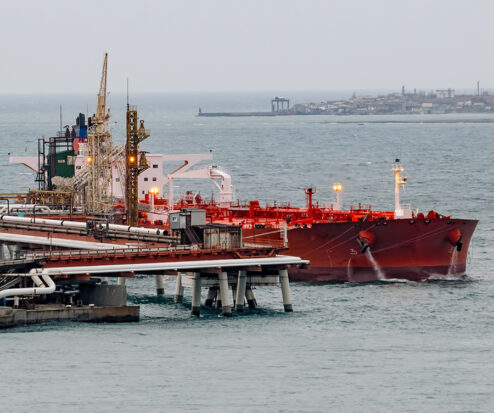Experts predict that the recent sanctions imposed by the US Department of the Treasury on Turkish and UAE-based shipping companies for breaching the price cap on Russian oil are likely the “opening salvo” of a sustained G7 enforcement effort.
On October 12, Washington imposed sanctions on UAE-based Lumber Marine SA and Turkish company Ice Pearl Navigation Corp for transporting Russian crude above the US$60 per barrel cap.
Since early December last year, the G7, European Union and Australia have forbidden their companies from providing shipping, finance, insurance or other services if they facilitate the sale of Russian seaborne crude priced above the threshold.
The aim is to squeeze the Kremlin’s oil revenues while ensuring a steady flow of affordable energy to developing countries, though concerns have emerged over the cap’s effectiveness amid an uptick in global crude prices.
The US’ Office of Foreign Assets Control (OFAC), a sanctions body which sits within the Treasury department, says the SCF Primorye, owned by Lumber Marine, exported Novy Port crude from Russia priced above US$75 a barrel.
The Yasa Golden Bosphorus, a ship registering Ice Pearl Navigation as its owner, is also accused of carrying ESPO crude oil above US$80 a barrel.
OFAC claims both vessels used US-based service providers while transporting the Russian crude, contravening rules laid out by the Price Cap Coalition.
Jason Prince, a partner at law firm Crowell & Moring and former OFAC chief counsel, says the designations send a clear message to “fence sitter” countries such as the UAE, Turkey, China and India, “that they should no longer doubt the Coalition’s resolve to put teeth in the price cap regime”.
“I anticipate that these two designations are the opening salvo in a sustained price cap policy enforcement push by not only OFAC, but also other Coalition partners,” Prince tells GTR.
Analysts say both of these vessels were already considered to be high risk and would likely have been flagged by risk compliance programmes, based either on their ownership structures or frequency of visits to Russia.
Byron McKinney, director for trade finance at S&P Global Market Intelligence, says the sanctioning of the SCF Primorye is a “token gesture” as the vessel’s ownership is linked to the already blacklisted Russian firm Sovcomflot.
“A closer look at the group owner highlights the original risk on this ship was already fully transparent. Lumber Marine’s care of address is the same as [Sovcomflot subsidiary] Sun Ship Management, a clear association,” he says in a LinkedIn note.
However, the sanctioning of the Yasa Golden Bosphorus could be “taken as a warning” by owners and haulers of Russian cargo, he says.
“There are plenty of other examples of similar owners and vessels currently in operation; the coming weeks and months will determine if this sanctioning has had a knock-on effect.”
A “second phase”
The price cap’s impact on Russia’s energy revenues has diminished due to rising crude prices.
An October Oil Market Report published by the International Energy Agency finds that Moscow’s oil export revenues surged by US$1.8bn to US$18.8bn in September, their highest since July 2022.
This jump came on the back of strong sales, with oil export volumes rising by 460,000 barrels per day to 7.6 million.
There are growing concerns that Russia may increasingly use G7 or EU ships and services to continue trading crude oil above the US$60 mark, relying on false documentation and other deceptive practices, experts say.
Eric Van Nostrand, acting assistant secretary for economic policy at the US Treasury, says the White House is gearing up for the second phase of its Russian oil price cap plans, following a “successful” first stage.
He has previously claimed that the cap dented Russian oil revenues by nearly 50% in the first half of 2023, as compared to the same period last year.
In a speech at the Brookings Institution on October 16, Van Nostrand said Moscow has also incurred a “large expense” from constructing an alternative ecosystem of ships and services, often labelled Russia’s “dark” or “shadow” fleet.
“Putin has purchased hundreds of new oil tankers for billions of dollars, and he faces elevated costs of insurance, longer transport times to new importers, elevated capital expenditures on domestic oil wells without G7 involvement, and reinvestments in ports that service non-G7 providers,” Van Nostrand said.
US Treasury secretary Janet Yellen has foreshadowed further enforcement action over violations of the price ceiling, telling the Wall Street Journal last week: “We are looking at enforcement very carefully and we want to make sure that market participants are aware we take this price cap seriously, and, to the extent Western services are used, we mean business about abiding by the cap.”
Alongside its enforcement action, OFAC also published a maritime advisory offering industry guidance on compliance with the cap, amid “increased safety, environmental, economic, reputational, financial, logistical, and legal risks”.
For instance, Russia’s shadow fleet relies on older ships and laxer safety regulations, potentially driving up the risk of “maritime casualties”, OFAC says, while a lack of formal insurance may mean shippers are unable to cover the costs of oil spills.
OFAC lists a total of seven recommendations – some of which were covered in the regulator’s landmark 2020 maritime advisory – including requiring appropriately capitalised P&I insurance, and “vigilantly” monitoring automatic identification system activities of ships as well as ship-to-ship transfers.
Despite the risks, trade finance banks and insurers in the G7, EU and Australia are protected by a “safe harbour” provision in the price cap scheme.
“As long as these service providers comply in good faith with the safe harbour scheme’s requirement to request and retain certain documentation showing that the Russian crude oil or petroleum products were purchased at or below the relevant price cap – and they don’t bury their heads in the sand when red flags arise – they will not be penalised for unwittingly advancing the evasion schemes of bad actors,” says Crowell & Moring’s Prince.







